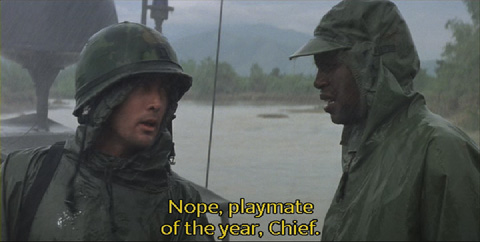I was less enthusiastic about the Playmate encounter. Were the Playmates so mindless that they were just lying around waiting to fuck anyone who wandered by? I enjoyed seeing the beautiful nudity, and the photography in the rain was spectacular, but I didn't think the women were portrayed as real human beings, and it seemed to me a wise decision to have cut this scene out in the first place. So what happened to the film overall? Well it's an even better film about Vietnam - richer, deeper, even more surreal. But there's nothing that the re-cut did or can do to change the fact that the last 20 minutes are babble, so it's still a lame film about Kurtz. The advantage of the new cut is that it changes the focus. The 1979 cut was essentially a film about the search for Kurtz. The 2001 cut is simply a film about a journey through Vietnam, with far more distractions from the Kurtz mission, thereby minimizing the part of the film that didn't work as well. Overall, I'd have to say it made a great movie even greater. It made the tragic flaw less significant, even if it couldn't eliminate it altogether. Frankly, when I watch this, I just sort of pretend that Kurtz didn't exist. With the combination of the newly processed film, the richly saturated jungle colors, the mood and music, I think you would be hard-pressed to find another film with the power and sweep of this one. I double dare you to sit through this one and not be blown away. You will feel like you have actually been in the war, and what better compliment can I give a war film? It richly deserves its place in the Top 50 of all time, and maybe it's even a bit underrated. It caught the absurdity of the war, and it caught the darkness in our hearts. It's a much bigger, more audacious film than Coppola's The Godfather, which is actually rated #1 at IMDb. |
|||||
|
|
|||||
|
|
|||||
|
Tuna's comments in yellow: Apocalypse Now: Redux (2001) is a remastered and greatly extended version of IMDb's #36 film of all time. I planned on fast forwarding to the new exposure and calling it an early night, but I ended up watching the entire 202 minutes, and may do it again soon. Worlds like epic, magnificent, powerful and spectacular come to mind. You can smell the rotting vegetation of the jungle and feel the hot humid air. You experience the boredom of traveling up river, and the sudden terror of an enemy attack. Coppola had many spectacular shots in the film
|
||||
|
|||||


